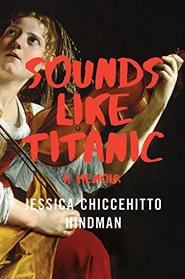What is it, exactly? Subtitled a memoir, _Sounds Like Titanic_ jumps back and forth between Hindman's youth in rural West Virginia and her role as a violinist for the God Bless America Tour 2004.
What is so unusual about the Tour is that Hindman, and the other musicians, are instructed to play as quietly as possible in front of dead microphones - while music blasts from a CD player purchased from Walmart by the Composer (who remains anonymous throughout because the book is not about calling him out, according to Hindman, but whose identity can be fairly easily Googled). At each show, at a craft fair or at the Mall of America or on stage, the "fake" musicians (don't) play, while crowds flock to purchase CDs of music that sounds, well, like the soundtrack to Titanic.
These two chronologies are interspersed with other reflections ("How to Become a Famous Violinist," "The Geography of a Lead-Up to a War," "One Night, Everyone in the RV Watches _Master and Commander_," "But Why Is Playing the Violin the Cultural Equivalent of Growing a Penis?", etc.) In them, Hindman shares her struggles with various cultural conundrums and preoccupations, primarily her distaste for "ignorant America's" reaction to September 11th and her childhood notion of "life in the body" which leads to social anxiety and simultaneously feeling the fear of impending death and the need to pee on-stage. Underscoring all of this (pun intended) is Hindman's shifting sense of identity: if she's a good-but-not-great violinist, if onlookers believe she's a great world-famous violinist, if she knows she's not playing what listeners are hearing...what kind of musician is she?
One unusual aspect of _Sounds Like Titanic_ is Hindman's frequent use of second-person point-of-view, which places "you" as reader directly in her concert heels. A bit distracting initially, Hindman's narrative choice becomes less intrusive, except when her opinion disagrees with "your" own.
What is so unusual about the Tour is that Hindman, and the other musicians, are instructed to play as quietly as possible in front of dead microphones - while music blasts from a CD player purchased from Walmart by the Composer (who remains anonymous throughout because the book is not about calling him out, according to Hindman, but whose identity can be fairly easily Googled). At each show, at a craft fair or at the Mall of America or on stage, the "fake" musicians (don't) play, while crowds flock to purchase CDs of music that sounds, well, like the soundtrack to Titanic.
These two chronologies are interspersed with other reflections ("How to Become a Famous Violinist," "The Geography of a Lead-Up to a War," "One Night, Everyone in the RV Watches _Master and Commander_," "But Why Is Playing the Violin the Cultural Equivalent of Growing a Penis?", etc.) In them, Hindman shares her struggles with various cultural conundrums and preoccupations, primarily her distaste for "ignorant America's" reaction to September 11th and her childhood notion of "life in the body" which leads to social anxiety and simultaneously feeling the fear of impending death and the need to pee on-stage. Underscoring all of this (pun intended) is Hindman's shifting sense of identity: if she's a good-but-not-great violinist, if onlookers believe she's a great world-famous violinist, if she knows she's not playing what listeners are hearing...what kind of musician is she?
One unusual aspect of _Sounds Like Titanic_ is Hindman's frequent use of second-person point-of-view, which places "you" as reader directly in her concert heels. A bit distracting initially, Hindman's narrative choice becomes less intrusive, except when her opinion disagrees with "your" own.




